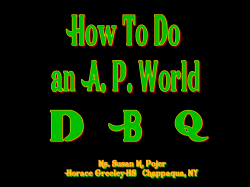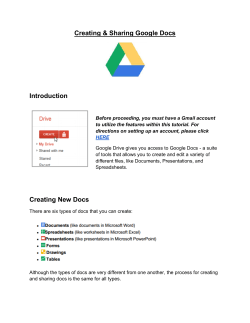
Dr. POWER SOTOMAYOR`s SYLLABUS
Dimensions of Culture Program DOC Office: Sequoyah Hall 132 docinfo@ucsd.edu Spring Quarter 2015 http://marshall.ucsd.edu/doc revised * 3/31/15 SYLLABUS DOC 3: Imagination Dr. Jade POWER SOTOMAYOR Lecture B: MWF 11:00-11:50 in Solis 107 jypower@ucsd.edu Office: Sequoyah Hall 134 Office Hours: Wednesday 1:00-2:00 Course Description: America has a vivid imagination. Is this what gives us hope for a better future or the stuff of foolish pipedreams? Is this a utopian vision or a mass hallucination? In this class we will interrogate the ways in which America and Americans have attempted to define the terms of existence through cultural production. The tools of communication (on stage, on screen, and in print) have shaped the ideologies that govern our senses of self and beliefs about each other. Simultaneously, culture is always produced in relationship to existing ideological frameworks, at times perpetuating and at times challenging these beliefs. Our main goal is to examine a variety of cultural artifacts of modern American culture (novels, plays, music, film and video) and understand them as historical and ideological documents composed of specific formal elements. Required Texts: 2015 DOC 3 Reader for Dr. Power Sotomayor (Lecture B) and Dr. George-Graves (Lecture C) – This is a custom textbook published exclusively by University Readers/Cognella. The Iceman Cometh by Eugene O’Neill Yellow Face by David Henry Hwang The three books above should be purchased from http://universityreaders.com – click on “Students Buy Here” on the right side of the page. A copy of each book will be available at Class Reserves for use in the library. The DOC Readers change from year to year, so students need to purchase the reader for the current quarter which is only available through this website. Additional required readings/texts can be found online (see links in syllabus) or on TED. Grading: University email messages – Official communications from the DOC office and instructors will be sent to enrolled students’ @ucsd.edu email addresses via TritonLink. Students are responsible for reading this information. Please check your email daily. Paper 1................................................................................. Final Capstone Project………............................................ Final Exam…………...………............................................ Section Assignments (pre-writing, journals, etc.)............... Section Participation............................................................ Section Attendance.............................................................. 25% 35% 20% 10% 5% 5% Lecture Protocol: You are expected to attend all lectures and participate by listening, taking notes, and asking questions when appropriate. You should arrive at class on time, and not leave before the end of lecture. Because the use of computers and other electronic devices can be disruptive in class, you should bring paper and pens to take notes. Laptops, cell phones, iPods, tablets, etc., may not be used in DOC lecture. Please keep them turned off and in your bag under your seat. DOC 3 Syllabus – Dr. Jade POWER SOTOMAYOR page 1 Attendance and Participation Policy: Attendance and participation are required at all discussion sections, starting March 31 or April 1. In order to earn the highest Section Participation score, you must complete the corresponding readings prior to each class and be ready to discuss them and/or ask questions. Listen to others, and show respect for people, ideas, and perspectives with which you may disagree. If you are absent from discussion section more than three times, for any reason (e.g., an emergency or illness), 5% of your course grade will be a zero. There are no “excused absences,” so if you don’t want to be penalized you should not miss four or more discussion sections. Your Teaching Assistant will explain his/her Section Assignments in class. Writing Assignments: The writing assignments this quarter build on the fundamentals of critical reading and analysis introduced in DOC 1 and 2: reading actively; analyzing key points in an argument; analyzing ideological intersections at work in a text; applying key concepts learned in the course; and using relevant course lectures and readings to place primary texts in their historical and cultural contexts. The purpose of DOC 3 is to enable undergraduate students, through rigorous practice, to critically read and write academic arguments about culture. Students who successfully complete DOC 3 writing assignments will be able to: 1) Practice all aspects of the writing process, including outlining, drafting, editing, and revising; 2) Argue and defend a claim that is informed by multiple sources; 3) Select and use evidence in clear and effective ways; 4) Analyze evidence effectively using key terms and concepts; 5) Explain the significance of an argument; 6) Use various kinds of feedback to revise papers effectively; and 7) Cite sources effectively using MLA format. Note: late work will only be accepted in verifiable emergencies or if arranged with the Teaching Assistant before the due date. Additional Reading & Writing Assistance: Beyond DOC, UCSD offers a variety of support programs. Students are encouraged to contact OASIS (http://students.ucsd.edu/academics/_organizations/oasis/index.html) and the Writing Center (http://writingcenter.ucsd.edu/) for general and DOC-specific writing and reading programs. Your first line of support regarding writing should be your DOC TA and/or Dr. Jeff Gagnon, the DOC Writing Director. Maintaining Academic Integrity: While DOC strongly encourages intellectual cooperation and discussion, all material submitted for a grade must represent your own work. Proper citation of others’ work is required. The rules for incorporating MLA documentation can be found on Purdue University’s Online Writing Lab: http://owl.english.purdue.edu/owl/resource/747/01/. Suspicions of academic misconduct and plagiarism will be investigated, and verified cases will be reported to the Academic Integrity Office according to university policy. A finding of plagiarism will result in an “F” grade. See: https://students.ucsd.edu/academics/academicintegrity/ai-and-you.html Students agree that by taking this course all required papers will be subject to submission for textual similarity review to Turnitin for the detection of plagiarism. All submitted papers will be included as source documents in the Turnitin.com reference database solely for the purpose of detecting plagiarism of such papers. Use of the Turnitin service is subject to the terms of use agreement posted on the Turnitin.com site. – SCHEDULE OF READINGS – Numbered readings below refer to 2015 DOC 3 Reader for Dr. Jade Power Sotomayor (and Dr. George-Graves) – see the Table of Contents in the Reader for page numbers. WEEK 1: IMAGINATION NATION: AMERICAN IDENTITY AND THE “POST-WAR” MARCH 30-APRIL 3 In addition to laying out the key terms of study for the course, this week we will discuss the ways in which Americans imagine and reimagine themselves as a powerful community (a nation) through cultural production particularly in post-war moments. What brings us together and what pulls us apart? What does the nation promise? Who is included in this narrative of promise? 1. “Keywords” in DOC 3 Reader DOC 3 Syllabus – Dr. Jade POWER SOTOMAYOR page 2 2. “The New Negro” by Alain Locke (1925) 3. “Harlem: The Cultural Capital” by James Weldon Johnson (1925) ONLINE: “Thinking About Social Change in America” in Bowling Alone: The Collapse and Revival of American Community by Robert Putnam http://academic.evergreen.edu/curricular/ppandp/PDFs/Thinking%20about%20Social% 20Change%20in%20America.pdf WATCH: National Anthems José Feliciano (World Series, 1968): https://www.youtube.com/watch?v=x1ZQawbo4Mo Jimi Hendrix (Woodstock 1969): https://www.youtube.com/watch?v=sjzZh6-h9fM Marvin Gaye (NBA, 1983): https://vimeo.com/34606761 Sebastien de la Cruz (NBA, 2013): https://www.youtube.com/watch?v=8GivmO32OSk WEEK 2: DREAMING AMERICA APRIL 6-10 “Dreaming” has become a key motif of American identity. What has “the American Dream” meant over time? Will we ever wake up? What are the contradictions of the American Dream? SEPARATE TEXT: The Iceman Cometh by Eugene O’Neill (playscript) 4. “Harlem [2]” by Langston Hughes ONLINE: The DREAM ACT White House Fact Sheet: https://www.whitehouse.gov/sites/default/files/DREAM-Act-WhiteHouse-FactSheet.pdf WATCH: “I Have a Dream” by Martin Luther King, Jr.: https://www.youtube.com/watch?v=smEqnnklfYs * WEEK 3: CRITICAL STAGINGS APRIL 13-17 Control over representation has been crucial to not only the national imaginary but also political power and economic development. How are dominant discourses reproduced through representation? How has representation been an important site for a counterhegemonic pushback? Over the next few weeks, we will examine cultural battles to define ethnicities, subcultures and authenticity across several media. This week we discuss stage performances. 7. Sun, Moon, and Feather by Spiderwoman Theater SEPARATE TEXT: Yellow Face by David Henry Hwang (playscript) WATCH: The Couple in the Cage by Guillermo Gómez-Peña and Coco Fusco (library reserves) WATCH: Zoot Suit by Luis Valdez (library reserves) WATCH: Bamboozled by Spike Lee (library reserves) * WEEK 4: SPACE AND CONTAINMENT APRIL 20-24 Manifest destiny gave America(ns) the belief in unlimited expansion (“Don’t fence me in!) at the same time ideologies had to be controlled and contained to maintain a cohesive national ethos. Contradictions abound in rhetoric about frontiers and borders. How do these projects conflict and simultaneously (paradoxically) support each other? ONLINE: “The Problem That Has No Name” by Betty Friedan http://nationalhumanitiescenter.org/ows/seminars/tcentury/FeminineMystique.pdf 5. “Homeland Aztlán” by Gloria Anzaldúa 6. English Translations for “Homeland Aztlán” by Jade Power Sotomayor DOC 3 Syllabus – Dr. Jade POWER SOTOMAYOR page 3 TED: “Setting the Stage: Modern Dance Universalism and the Culture of Containment” from How To Do Things with Dance: Performing Change in Postwar America by Rebekah J. Kowal WATCH: Appalachian Spring by Martha Graham (links available on TED) WEEK 5: LITERARY RUPTURES APRIL 27-MAY 1 We will continue our discussion on representation by looking at literature as a site of negotiation. TED: Excerpt from Big Little Man by Alex Tizon 8. “Senior Picture Day” by Michele Serros TED: “Gee You Don’t Seem Like an Indian from the Reservation” by Barbara Cameron 9. “Poetry is Not a Luxury” by Audre Lorde LISTEN: “Howl” and “America” by Allen Ginsberg; “The Revolution Will Not Be Televised” by Gil Scott Heron; and “Puerto Rican Obituary” by Pedro Pietri (links available on TED) WEEK 6: PROTESTING PERFORMANCE, PROTEST AS PERFORMANCE MAY 4-8 This week we will focus on public protest. Cultural production can actively reproduce existing power structures driving public outcry through the form of protest. We will look at protest as an under-examined form of cultural production and the ways in which imagination plays an important role in getting messages heard and effecting social change. 10. The “Miss Saigon Controversy” by Esther Kim Lee #Blacklivesmatter and Stonewall Riots (links available on TED) Another University is Possible, excerpts (links available on TED) WATCH: Selma directed by Ava DuVernay WATCH: Walkout directed by Edward James Olmos (library reserves) WATCH: Fires in The Mirror by Anna Deavere Smith (library reserves) WEEK 7: THE POLITICS OF APPROPRIATION MAY 11-15 Influence, inspiration, appropriation, borrowings, theft: all terms to define practices of intercultural crossings, from the benign to the beneficial and the nefarious. This week we will unpack the stakes at play when culture developed in one community migrates to others. 11. Langston Hughes “Note on Commercial Theater” 12. “How To Write The Great American Indian Novel” by Sherman Alexie 13. “Counterculture Indians and the New Age” by Phillip Deloria TED: (optional) “Sounds of Blackness Down Under” by E. Patrick Johnson WATCH: Videos by Iggy Azalea and Azealia Banks (links available on TED) WEEK 8: IDENTITY POLITICS, POLITICAL CORRECTNESS AND ITS DISCONTENTS MAY 18-22 As a concept, “identity politics” made an etymological, if not ideological, shift at the turn of the last century. Like “politically correct,” identity politics went from a progressive movement to understand, respect and avoid insulting the “other” to a burden of self-censorship imposed on the populace by the oversensitive. The era of the movie star president brought us the end of the cold war and new ideas about “post-war” identity ushering in a generation that performs itself in relation to what it is not (post-modern, post-human, post-emotional, post-race). It also brought us a DOC 3 Syllabus – Dr. Jade POWER SOTOMAYOR page 4 new relationship between the individual and the group. What were the rules of engagement in the culture wars? Who won? 14. Americanah (excerpts) by Chimamanda Adichie 15. “Poem for the Young White Man” by Lorna Dee Cervantes TED: “The Matter of Whiteness” in White by Richard Dyer WATCH: Angels in America by Tony Kushner (library reserves) WEEK 9: UTOPIAN FUTURES IN THE DIGITAL AGE MAY 27-29 (MEMORIAL DAY HOLIDAY) Well, now what do we do? We’ve analyzed the social construction of American identity through heroic feats of imagination. We’ve examined creativity within political economy. We’ve recognized the powers of hegemonic structures and cultural resistance. What lies ahead and what do the promises of scientific and technological advancements (e.g., DNA and the internet) portend? What is the future of the American cultural imaginary? Can we start over again? Can we reinvent ourselves? Can we imagine a better future? 16. “Never Again” by Rebecca Schneider TED: “She is Not Acting, She Is” Long Bui and Sabrina Strings WATCH: Episode of RuPaul’s Drag Race (link available on TED) WATCH: Oprah Winfrey and Henry Louis Gates, African American Lives (link available on TED) WEEK 10: OUT OF THE CLOSET: IT GETS BETTER PROJECT AND POPCULTURE FEMINISM JUNE 1-5 This week we will continue our conversation on contemporary discussions about imagining American identity while linking back to our opening questions. In addition, the instructor and TAs will review the class content in preparation for the final exam. “It Gets Better” Project (links available on TED) “This is What a Feminist Looks Like” Movement (link available on TED) Popular culture celebrities on feminism (Emma Watson, Beyoncé, Taylor Swift, Lena Dunham, Shonda Rhimes (links available on TED) FINAL EXAM: Lecture B (Power Sotomayor): Friday, June 12, 2015, from 11:30 to 2:30 PM DOC 3 Syllabus – Dr. Jade POWER SOTOMAYOR page 5
© Copyright 2025









